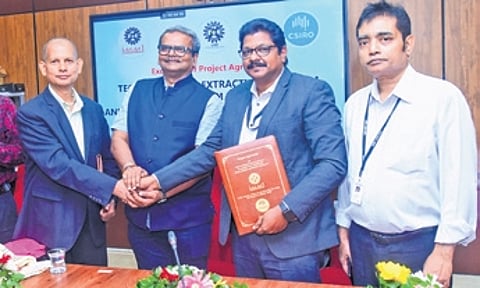

BHUBANESWAR: The Institute of Minerals and Materials Technology (IMMT), Bhubaneswar, has joined hands with Commonwealth Scientific and Industrial Research Organisation (CSIRO), Australia’s national science agency, for advanced research on critical minerals.
The two organisations on Thursday signed a research and development agreement to investigate the recovery of titanium dioxide from titanium minerals and vanadium-bearing titanium minerals of Indian origin. Speaking on the occasion, director of IMMT-Bhubaneswar Ramanuj Narayan laid emphasis on more such collaborative projects on critical minerals in line with the National Critical Mineral Mission for ensuring a long-term sustainable supply of critical minerals including beneficiation, processing and recovery from end-of-life products.
“This joint project aims at further developing CSIRO’s innovative titanium/vanadium processing technology for extracting titanium and vanadium from ilmenite and vanadiferous magnetite ores, which are abundant in India and Australia,” he said.
Titanium and vanadium are classified as critical minerals in both countries. Titanium is widely used in metal alloys, while vanadium is also a key component in redox flow batteries, which are rechargeable and well-suited for large-scale energy storage.
Funded by CSIRO’s India-Australia Critical Minerals Research Partnership, the project is a collaborative initiative under the Australian federal government’s updated IES, 2035.
As per the agreement, the project will advance the processing of Indian ores, potentially unlocking the country’s vast titanium deposits, the third largest in the world, while complementing CSIRO’s ongoing research on Australian deposits.
The project will be led by CSIRO’s principal research scientist Goutam Kumar Das and chief scientist and head of the hydro, bio, and electrometallurgy department at IMMT Kali Sanjay. It will be coordinated by group leader (critical minerals processing) at CSIRO Joanne Loh and IMMT director.